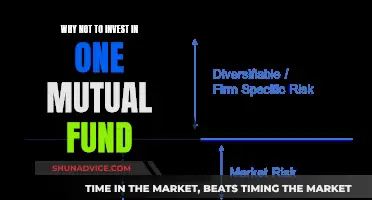
Investing in mutual funds is a popular option for retirement planning. Mutual funds are an investment option that is usually available to owners of retirement accounts. They are a pool of money from many investors, created and managed by a financial services company. An individual invests in a mutual fund to obtain the benefits of professional investment expertise and the clout that a mutual fund offers. Mutual funds are a good investment option for anyone looking for diversification in their portfolios. They offer diversification and convenience at a low cost. They are also highly liquid, making them easy to buy or sell.
| Characteristics | Values |
|---|---|
| Purpose | Retirement income funds are aimed at providing a steady cash payout for retirees. |
| Investment options | Stocks, bonds, mutual funds, ETFs, savings accounts, CDs, REITs, annuities, etc. |
| Risk | Generally considered safer than individual stocks due to diversification, but risk varies depending on the fund's composition. |
| Returns | Returns depend on the fund's performance and can be higher or lower than expected. |
| Taxes | Investments in 401(k) or IRA accounts can provide tax advantages. |
| Management | Mutual funds are professionally managed, while index funds are less hands-on and have lower fees. |
| Accessibility | Mutual funds are easily accessible through brokerage accounts or financial institutions. |
| Fees | Mutual funds have expense ratios and potentially other fees like loads or transaction fees. |
| Diversification | Mutual funds provide instant diversification by investing in a wide range of assets. |
| Expertise | Mutual fund managers have investment expertise and can maintain discipline during market volatility. |
What You'll Learn

Mutual funds vs. other retirement accounts
Mutual funds are a good option for retirement savings, but they are not the same as retirement accounts. Retirement accounts are savings accounts such as a 401(k) or an individual retirement account (IRA). Mutual funds are an investment option that is usually available to owners of retirement accounts.
Retirement accounts may hold any type of investment, such as exchange-traded funds (ETFs), stocks, bonds, commodities, or even real estate. Mutual funds are a type of investment that pools money from many investors, which is then used to invest in stocks, bonds, and other assets. The fund manager is responsible for maintaining the fund and adjusting its investments as needed.
One advantage of mutual funds is that they provide diversification, which can make them safer and less volatile than individual investments. When you invest in a mutual fund, your money is spread across dozens or hundreds of companies, reducing the impact of any single company's performance. Mutual funds also offer professional investment expertise and the clout that comes with pooling money with other investors.
However, mutual funds are generally purchased with after-tax dollars, and income from the fund is taxable. In contrast, 401(k) plans are typically tax-deferred, meaning you only pay taxes when you withdraw the money during retirement, when you are likely to be in a lower tax bracket. Additionally, there is no limit to the number of mutual funds you can purchase, making them an effective way to diversify your retirement portfolio.
When deciding whether to invest in mutual funds or other retirement accounts, it's important to consider your financial goals and risk tolerance. Mutual funds may be a good option if you want to benefit from diversification and professional investment expertise. On the other hand, retirement accounts like 401(k)s can offer tax advantages and may be a better choice if you prefer tax-deferred plans. It's also worth noting that you can invest in both mutual funds and retirement accounts like 401(k)s to create a well-rounded retirement savings plan.
Unit Investment Trust Funds: How They Work
You may want to see also

The benefits of diversification
Diversification is a key investment strategy, and it's one of the primary benefits of mutual funds. Here are the advantages of diversification when investing in mutual funds for retirement:
Reduced Risk
Diversification is a risk management strategy that involves spreading your investments across various assets, sectors, and industries. By doing so, you lower the risk of losing all your money if one particular investment or sector performs poorly. In other words, "don't put all your eggs in one basket."
Long-Term Growth
While diversification helps reduce risk, it also allows your money to grow over the long term. By investing in a variety of assets, you increase the potential for higher returns. Mutual funds provide access to a wide range of investments, allowing you to balance risk and reward in your portfolio.
Volatility Reduction
Diversification helps to reduce the volatility of your portfolio. Stocks are generally more volatile than other types of assets, and by diversifying into other asset classes, such as bonds, you can lower the overall volatility of your investments. This is especially important as you get closer to retirement, when you may want to protect your savings from market fluctuations.
Access to a Variety of Investments
Mutual funds pool money from many investors, allowing individual investors to access a wider variety of investments than they could afford on their own. This provides exposure to different sectors and industries, such as healthcare, technology, or international markets.
Professional Management
Mutual funds are managed by professional fund managers who make investment decisions based on extensive research and analysis. They have the expertise to navigate market fluctuations and adjust the fund's investments as needed. This can be especially beneficial for investors who don't have the time or expertise to actively manage their investments.
Dollar-Cost Averaging
Investing in mutual funds through regular contributions, such as payroll deductions, allows you to take advantage of dollar-cost averaging. This strategy involves investing a fixed amount at regular intervals, regardless of the market conditions. Over time, this helps to smooth out the impact of price volatility and can be a more effective way to build wealth than trying to time the market.
In summary, diversification in mutual funds provides a range of benefits, including reduced risk, long-term growth potential, volatility reduction, access to a variety of investments, professional management, and the ability to utilize dollar-cost averaging. These advantages make mutual funds a popular choice for investors saving for retirement, as they provide a balanced approach to building wealth while managing risk.
Invest Wisely: Franklin India Low Duration Fund Guide
You may want to see also

Access to different markets
Investing in mutual funds can provide access to different markets, even within the broad asset classes of stocks and bonds. This means that you can gain exposure to various segments of the market that may be of interest, diversifying your portfolio and reducing risk.
Within stocks, you can invest in companies of different sizes, from large to small, and those with different focuses, such as growth or dividend payouts. You can also choose to invest in companies located in developed or emerging markets.
Different classes of bonds are also accessible through mutual funds, including corporate bonds, government bonds, and international bonds. There are even bonds designed to protect against increases in inflation.
For example, if you want to invest in U.S. technology stocks, a mutual fund can provide that exposure. Or, if you're interested in investing in international bonds, a mutual fund can offer that access as well.
By investing in different markets, you reduce the risk of your portfolio being negatively impacted by the performance of a single sector or market. This diversification is a key advantage of mutual funds, allowing you to spread your investments across various assets and markets.
Invest in ASX Index Funds: A Comprehensive Guide
You may want to see also

Professional management
One of the main benefits of investing in mutual funds for retirement is that they offer professional management of your investments. This means that mutual fund managers can save you a lot of time and effort by doing the work of buying and selling stocks and other securities on your behalf.
Mutual fund managers are able to buy and sell large blocks of stocks and other securities, which means that their transaction costs are kept to a minimum. They are also guided by disciplined rules when it comes to picking investments, so they are not subject to the same emotional influences as individual investors. This means that they are less likely to be swayed by every twist and turn in the market, allowing them to stay the course even when markets are volatile.
Additionally, mutual fund managers are experienced in dealing with the ups and downs of full market cycles, so they are better equipped to maintain their discipline during both turbulent and frothy market conditions. This is especially important for actively managed funds, which aim to outperform the market by having fund managers select and time the buying and selling of investments.
When comparing different mutual funds, it is worth considering the fund's operating expense ratios and any loads or transaction fees. It is also worth looking at the fund manager's track record in terms of either matching or outperforming the market, although it is important to remember that past performance does not guarantee future results.
Launching an Investment Fund: A Comprehensive Guide
You may want to see also

Index funds vs. actively managed funds
Index funds and actively managed funds are two types of mutual funds, differing in their management style, investment objective, and cost.
Management Style
Index funds are passively managed, meaning they aim to mirror the performance of a specific market index, such as the S&P 500. Their holdings automatically track an index, and there is no need for human oversight on buying and selling. This passive approach results in lower fees.
On the other hand, actively managed funds are actively managed by professional money managers who hand-select investments with the goal of beating the market returns. These funds try to outperform their benchmark and may invest across multiple indexes and various investment types. Actively managed funds have higher fees due to the cost of employing investment managers and their teams.
Investment Objective
The objective of index funds is to match the performance of the underlying index, providing market-average returns. They aim for broad market exposure and diversification across sectors and asset classes.
In contrast, the objective of actively managed funds is to outperform the market and provide higher returns. They may seek to diversify portfolios by investing in value stocks or weighting assets towards specific companies.
Cost
Index funds have lower expense ratios because they are passively managed and do not require the same level of research, trading, and marketing costs as actively managed funds. The higher fees of actively managed funds can cut into the returns that investors receive. Additionally, index funds tend to be more tax-efficient, distributing fewer taxable capital gains.
Performance
Over the long term, index funds have often outperformed actively managed funds, especially after accounting for fees and expenses. However, in certain market conditions, actively managed funds may have the opportunity to outperform the market in the short term.
How to Invest Your Roth IRA Funds
You may want to see also
Frequently asked questions
Yes, mutual funds are a good investment option for retirement as they offer diversification and convenience at a low cost. They are also a good option for those who don't want to pick and choose individual investments but still want to benefit from the stock market's high average annual returns.
Mutual funds provide access to different markets and asset classes, helping to reduce risk. They also offer professional management, which can save investors time and money. Additionally, mutual funds are highly liquid, making them easy to buy or sell.
When choosing a mutual fund for retirement, consider the fund's operating expense ratios, loads or transaction fees, historical performance, fund manager experience, and tax cost ratios. It is also important to assess your own risk tolerance and investment goals.
Some specific mutual funds that are often recommended for retirement include the Vanguard Wellington Fund, Dodge and Cox Income Fund, and T. Rowe Price Dividend Growth Fund. Additionally, retirement income funds from companies like T. Rowe Price and Schwab can be a good option.
As with any investment, there are risks associated with mutual funds. It is possible to lose money in mutual funds, especially if you need to withdraw your money during a market downturn. Additionally, actively managed mutual funds may underperform the market and may cost more than passive index funds.







